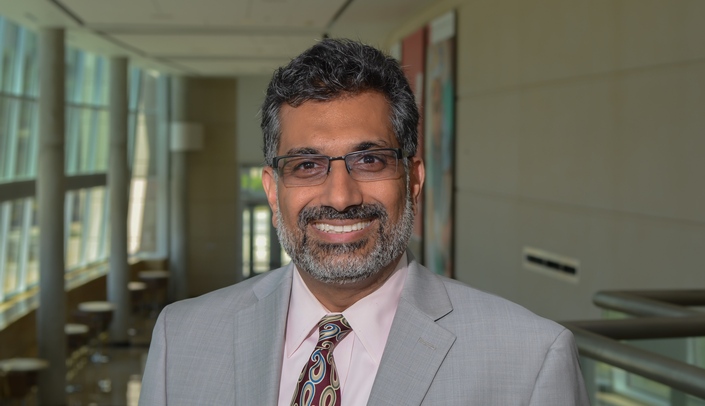Every scientist has a unique role in leading the research and communication efforts to help the public understand new discoveries, drug therapies and vaccines.
In light of the poor national response to the COVID-19 pandemic and the continued challenges with vaccine confidence, it has never been more important for scientists to clearly and confidently communicate their research, said Ali S. Khan, MD, MPH, dean of the College of Public Health at the University of Nebraska Medical Center.
Dr. Khan is one of three keynote speakers presenting at the 2021 IDeA Central Regional Conference. Their topics include science versus anti-science; diversity, equity and inclusion; and the intersection of engineering and biomedical research.
The Nebraska Institutional Development Award Program (IDeA) Networks of Biomedical Research Excellence (INBRE) program will host the virtual conference, July 26-27.
"It’s important for the IDeA scientists to understand how the current COVID outbreak will fundamentally change how the U.S. responds to public health emergencies in the future and their unique role in driving new discoveries and improving science literacy," Dr. Khan said.
A former assistant surgeon general with the U.S. Public Health Service, Dr. Khan’s professional career has focused on health security, global health and emerging infectious diseases.
Dr. Khan will be joined by Sheritta Strong, MD, assistant professor in the UNMC Department of Psychiatry and director of the Office of Inclusion.
Dr. Strong will discuss best practices in equity, diversity and inclusion in research, along with commonly experienced barriers for women and underrepresented minorities in science and best practices to help a research team identify barriers to inclusion and actions steps to support and integrate all team members.
Another aspect to be considered is in the review process for applications, Dr. Strong said.
"We will discuss ways to begin addressing equity, diversity and inclusion in this process and how that relates to the admissions or reviewers’ perspective and/or the applicant's perspective," she said.
Joining Drs. Strong and Khan is Steven Soper, PhD, a distinguished professor in chemistry and mechanical engineering at the University of Kansas.
Dr. Soper will discuss the COBRE and Biotechnology Resource Center projects he and his team are developing to address the medical needs of clinicians.
Dr. Soper’s research focuses on building diagnostic tests for a number of different cancer diseases. One collaborative project involving pancreatic cancer is the development of a companion diagnostic tool to help clinicians determine if the drug therapy they are testing will produce the best outcome for the patient.
"We are improving public health by building unique research and educational infrastructure that serves diverse students and faculty and is focused on precision medicine that addresses clinical needs in various disease states," he said.
NE-INBRE to host 2021 IDeA Central Regional Conference
- Written by Lisa Spellman
- Published May 18, 2021

Ali S. Khan, MD, MPH, dean of the College of Public Health at the University of Nebraska Medical Center
The 2021 IDeA Central Regional Conference will be held virtually via Zoom July 26-27.
Faculty and students can submit abstracts through June 23.
Co-chairs will evaluate the abstracts by scientific theme and will determine the six abstracts for oral presentations. The remaining abstracts will be poster presentations. Notifications of oral or poster presentation status will be sent out by July 1.
To see the agenda and register for the conference click here. Once registered a Zoom link will be sent.